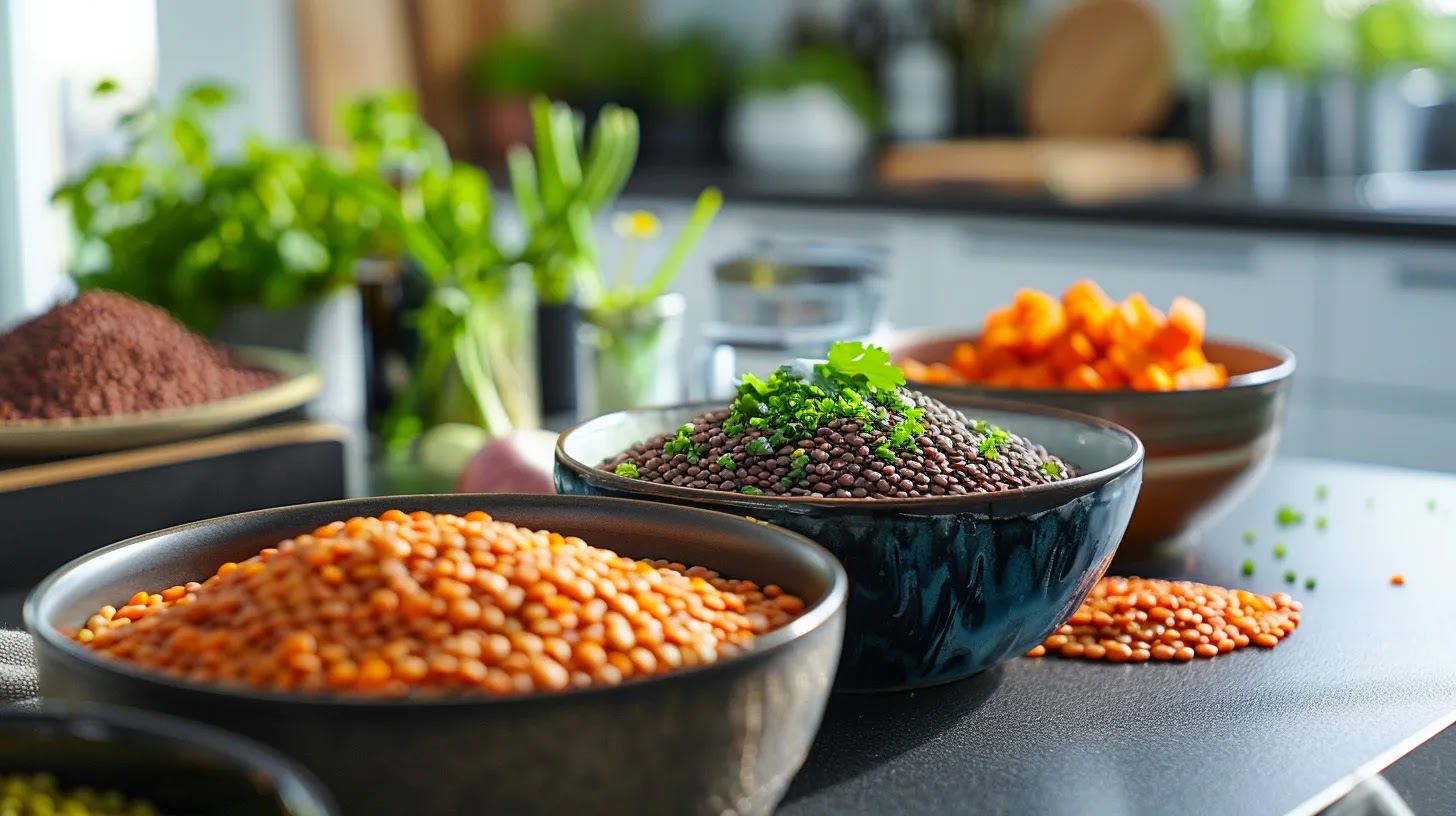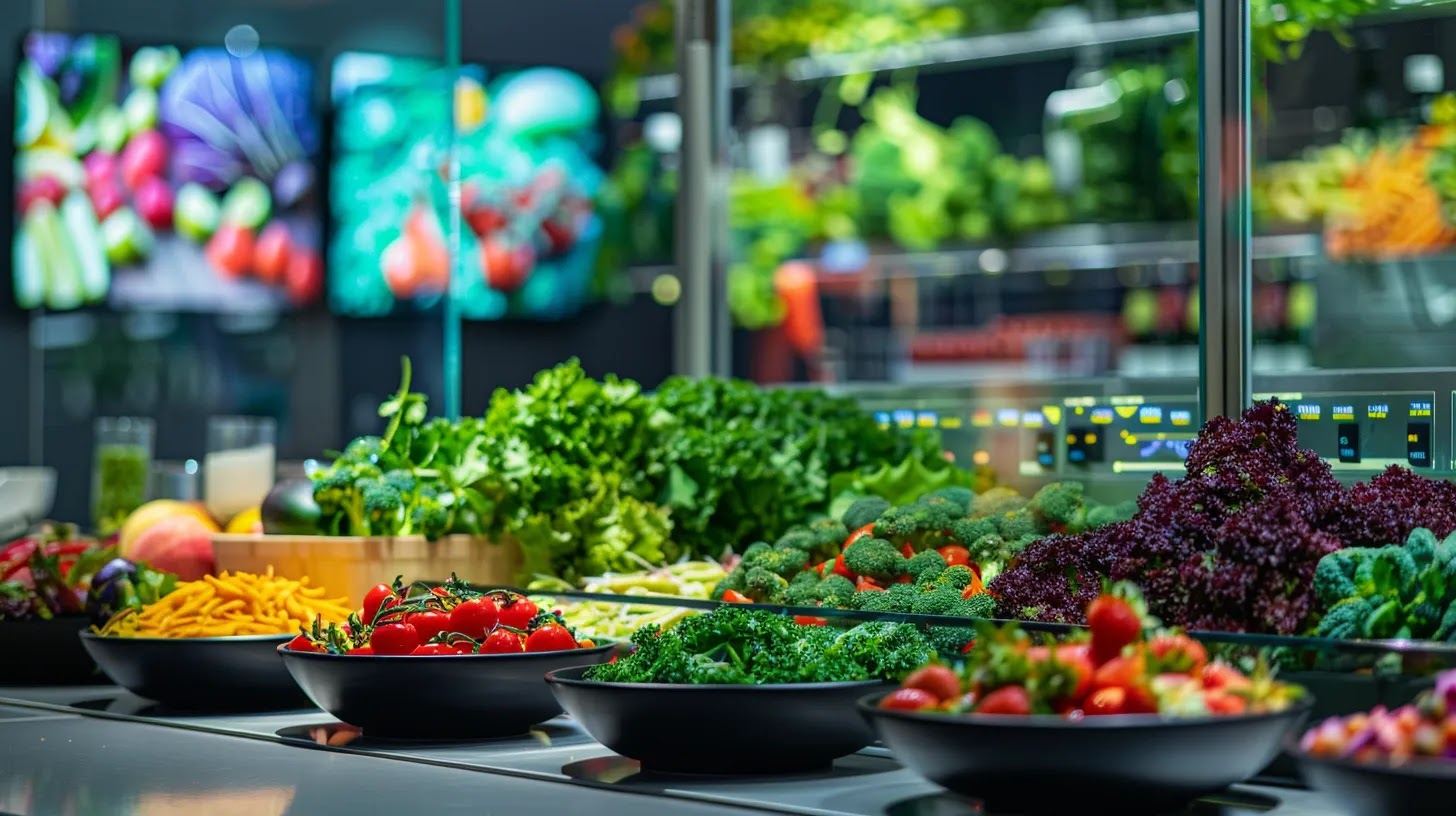Is it possible to lose weight effectively while following a vegan diet? Many individuals struggle with weight management and find it challenging to obtain enough protein without animal products. This post will explore vegan protein sources that support weight loss, how to craft a balanced weight loss plan, and the common challenges associated with this approach. Readers will gain practical strategies to fuel their weight loss journey with vegan protein, helping them overcome obstacles and meet their goals sustainably.
Key Takeaways
- Plant-based proteins support weight management while promoting muscle retention and overall health
- High-protein vegan foods like lentils and soybean aid in satisfying hunger without excess calories
- Meal planning and tracking food intake enhance nutritional balance and weight loss success
- Engaging with supportive communities encourages motivation and accountability in a plant-based lifestyle
- Incorporating a variety of nutrient-dense ingredients ensures effective weight loss and dietary satisfaction
Understanding Vegan Protein Sources for Weight Management

Identifying the best plant-based protein options is essential for effective weight management. Lentils, beans, and sweet potatoes offer varying protein contents and nutritional benefits. Understanding the role of protein in weight loss helps inform meal choices. This section will compare the protein content in different vegan foods, their nutritional profiles, and suggest protein-rich meal and snack ideas to support weight goals.
Identifying the Best Plant-Based Protein Options
When it comes to plant-based protein options, barley stands out due to its high fiber content and versatility in various recipes. Roasting pumpkin seeds enhances their flavor and crunch while also providing significant protein, making them an excellent snack for those focused on weight management. Additionally, incorporating flour made from lentils or chickpeas into meals can elevate protein intake, which is beneficial for individuals, including breastfeeding mothers, seeking to maintain a balanced diet without compromising their weight goals.
The Role of Protein in Weight Loss
The role of protein in weight loss is significant, as it aids in muscle preservation while promoting fat loss. According to the Dietary Guidelines for Americans, incorporating sufficient protein can help maintain a healthy mass, which is crucial for active lifestyles. Additionally, plant-based proteins, rich in essential amino acids, can be easily integrated into meals, helping individuals manage their weight without the necessity of high-calorie cream or dairy options.
Comparing Protein Content in Different Vegan Foods
Comparing protein content among various vegan foods is crucial for those aiming to manage weight effectively. For instance, soybeans are recognized for their high protein content, offering about 36 grams per cup when cooked, which helps in muscle building and reducing inflammation. Chickpeas also provide an excellent source, containing approximately 15 grams of protein per cooked cup, making them ideal for satisfying snacks or meals low in calories:
| Food Source | Protein Content (per cooked cup) | Calories |
|---|---|---|
| Soybeans | 36 g | 298 |
| Chickpeas | 15 g | 269 |
| Lentils | 18 g | 230 |
| Pumpkin Seeds | 12 g | 126 |
Nutritional Profiles of Key Vegan Proteins
Nutritional profiles of key vegan proteins are vital for those pursuing effective weight management. For instance, whole grains like quinoa not only provide protein but also essential fiber, supporting digestion and satiety. Meanwhile, legumes, such as lentils and chickpeas, offer a great source of protein while being low in calories, making them ideal diet foods. Incorporating fermented options like tempeh can enhance nutritional benefits and gut health, while a vegan meal replacement powder can serve as a convenient source of protein for busy individuals looking to maintain their dietary goals.
- Whole grains like quinoa supply protein and fiber.
- Legumes such as lentils and chickpeas are low-calorie protein sources.
- Fermented foods like tempeh improve gut health and nutrition.
- Vegan meal replacement powders provide quick protein solutions for busy lifestyles.
Protein-Rich Meals and Snacks Ideas
Individuals seeking effective weight management can benefit from incorporating protein-rich meals and snacks into their diets. Options such as a stir-fry made with tofu or tempeh can provide a significant boost of soy protein, enhancing energy levels while remaining gluten-free. For a quick snack, a smoothie with ground flax seeds and almond milk can offer a nutritious source of protein, delivering essential nutrients without excess calories.
Here are some examples of protein-rich meals and snacks:
| Meal/Snack | Main Ingredients | Protein Content |
|---|---|---|
| Tofu Stir-Fry | Tofu, mixed vegetables | 20 g |
| Chickpea Salad | Chickpeas, spinach, olive oil | 15 g |
| Flaxseed Smoothie | Ground flax, almond milk, banana | 8 g |
| Tempeh Wrap | Tempeh, whole grain wrap, veggies | 25 g |
Understanding vegan protein sources is only the first step. Now, it’s time to build a weight loss plan that makes those proteins work for you.
Crafting a Weight Loss Plan Incorporating Vegan Protein

Setting realistic weight loss goals is essential for success and working with vegan protein sources can facilitate healthier nutrition. Building balanced meals incorporating kale and other nutrient-dense foods, adjusting caloric intake based on individual needs, and applying effective meal prep tips ensure consistency. Additionally, tracking progress and adjusting strategies based on research enhances overall achievement in weight management.
Setting Realistic Weight Loss Goals
Setting realistic weight loss goals is vital for sustainable success, especially when incorporating vegan protein sources. Individuals can consider options like seitan, which is rich in protein and low in carbs, while foods such as cauliflower provide low-calorie, high-nutrient alternatives. Including B vitamins in meals helps regulate energy levels and manage hunger effectively, while focusing on unsaturated fat sources can further enhance overall dietary balance, aiding in weight management efforts.
Building Balanced Meals With Vegan Protein
Building balanced meals with vegan protein involves incorporating a variety of nutrient-dense ingredients that support muscle maintenance and overall health. For instance, pairing wild rice with a source of protein such as walnuts or nut butter can create a satisfying and sustaining meal that keeps hunger at bay. Additionally, incorporating peanut butter into smoothies or spreads not only boosts protein intake but also adds healthy fats, making it easier to meet nutritional goals while managing weight effectively.
Adjusting Caloric Intake for Effective Weight Loss
Adjusting caloric intake is a fundamental aspect of effective weight loss while incorporating vegan protein sources. Individuals should aim to balance their meals by including ingredients rich in essential amino acids, such as quinoa and lentils, which not only support muscle retention but also enhance metabolism. Additionally, foods like spinach can provide iodine, contributing to thyroid health and metabolic function, further assisting those on a weight management journey.
Meal Prep Tips for Consistency
Meal prep is essential for maintaining consistency in a weight loss plan, particularly when incorporating vegan protein sources. Preparing meals in advance allows individuals to control portion sizes, such as measuring out ounces of protein-rich foods like lentils and quinoa, which supports effective digestion. Utilizing vegan protein powder in smoothies or baked goods can enhance nutritional value, and selecting whole ingredients while minimizing food processing ensures meals remain wholesome and satisfying.
- Select protein-rich foods and measure them in ounces for portion control.
- Incorporate vegan protein powder in meals for added nutrition.
- Focus on whole ingredients to minimize food processing.
- Prepare balanced meals, including rice and vegetables, in advance.
Tracking Progress and Adjusting Strategies
Tracking progress is an essential component of a weight loss plan that incorporates vegan protein. Individuals should monitor their intake of nutrient-rich foods such as oatmeal, which offers fiber and complex carbohydrates, along with sources of lysine like lentils and quinoa. Additionally, integrating dried fruit as a snack can provide quick energy while ensuring adequate folate intake, crucial for metabolic processes, particularly for those avoiding animal products. By regularly assessing dietary habits and making adjustments as needed, a more effective approach to weight loss and nutritional balance can be achieved.
Even with a solid plan, the road to weight loss can be bumpy. It’s vital to recognize the common challenges that arise when pairing vegan protein with your goals.
Common Challenges With Vegan Protein and Weight Loss

Individuals often face several challenges when adopting a vegan diet for weight loss, including concerns about protein deficiency and managing cravings. Maintaining energy levels is another key issue that can lead to fatigue if not addressed effectively. Moreover, navigating social situations and dining out adds complexity, while avoiding processed vegan protein products can enhance overall nutrition. Insights into these areas, including the importance of incorporating nuts and understanding sources like wheat for protein, will provide valuable strategies for success.
Overcoming Protein Deficiency Concerns
To overcome concerns about protein deficiency in a vegan diet, it is important to include a variety of protein sources such as cereals and legumes, which provide essential amino acids without excessive sodium or saturated fat. Incorporating yeast products can also enhance protein intake while delivering additional antioxidants, supporting overall health. By consciously planning meals that integrate different protein-rich foods, individuals can help ensure they meet their nutritional needs and successfully manage weight while following a plant-based lifestyle.
Managing Cravings on a Vegan Diet
Managing cravings on a vegan diet can be a challenge, particularly when it comes to balancing nutrient intake with dietary preferences. Incorporating high-protein foods like legumes and mycoprotein can help curb these urges, as they provide essential nutrients and promote satiety. Including nutrient-dense options such as collard greens not only supports the immune system but can also aid in reducing the risk of hypertension, allowing individuals to maintain a healthy eating pattern while effectively managing cravings.
| Craving Management Tips | Protein Source | Nutritional Benefit |
|---|---|---|
| Fill with Fiber | Legumes | High in protein, low in calories |
| Incorporate Plant Proteins | Mycoprotein | Rich in amino acids, supports muscle health |
| Boost Nutrient Intake | Collard Greens | Enhances immune function, lowers blood pressure |
Addressing Energy Levels and Fatigue
Addressing energy levels and fatigue is crucial for individuals following a vegan diet while pursuing weight loss. Incorporating nutrient-dense foods, such as whole grains, cabbage, and leafy greens, can provide essential iron and calcium, aiding in the prevention of fatigue. It is important to ensure proper dietary balance, as those at risk for kidney disease should monitor their protein intake from sources like beans and lentils to maintain optimal energy and health levels:
- Focus on whole grains for sustained energy.
- Include cabbage for its vitamin content and digestive support.
- Ensure adequate iron intake through legumes and fortified cereals.
- Monitor protein sources for those managing kidney disease.
Dealing With Social Situations and Eating Out
Dealing with social situations and eating out can be challenging for those focusing on vegan protein for weight loss. When attending gatherings or dining at restaurants, individuals can opt for dishes rich in zinc and plant-based ingredients, like salads that include peanut toppings or legumes. Carrying a vegan protein powder low calorie option can also help maintain nutrition and satiety, providing a convenient solution that aligns with dietary goals without compromising on flavor or satisfaction, according to insights from the Academy of Nutrition and Dietetics.
Avoiding Processed Vegan Protein Products
Avoiding processed vegan protein products is crucial for anyone seeking to maintain a healthy diet while pursuing weight loss. Many processed options, while convenient, can contain excessive sodium, additives, and preservatives that may hinder progress in weight management. Individuals can benefit from incorporating whole food sources of protein, such as lentils or black beans, which directly nourish the body at the cellular level, supporting overall health and satiety without the drawbacks of highly processed alternatives. By focusing on natural protein sources and minimizing reliance on processed items, one can achieve a more effective weight loss journey.
Eating well is only part of the journey. Regular exercise can amplify weight loss, turning effort into success.
The Impact of Regular Exercise on Weight Loss Success

Integrating strength training with vegan protein sources like pea and spelt can enhance muscle efficiency during workouts. Cardiovascular exercises complement this by addressing specific nutritional needs, especially incorporating soy milk and other dietary supplements that provide dietary fiber. Additionally, emphasizing flexibility and recovery along with staying active beyond the gym ensures comprehensive health benefits. Connecting diet and exercise leads to optimal results in weight management.
Integrating Strength Training With Vegan Protein
Integrating strength training with vegan protein sources can significantly enhance weight loss efforts by promoting muscle retention and overall physical fitness. Including seeds like hemp and chia offers complete protein profiles, rich in essential amino acids that support muscle repair and growth. Furthermore, adding oils such as flaxseed oil can contribute beneficial minerals, supporting brain function and metabolic health, which are crucial for an active lifestyle.
| Ingredient | Protein Content | Key Benefits |
|---|---|---|
| Hemp Seeds | 10 g per 3 tbsp | Complete protein, omega fatty acids |
| Chia Seeds | 5 g per 2 tbsp | Fiber-rich, omega-3 source |
| Flaxseed Oil | 0 g | High in omega-3, supports brain health |
Cardiovascular Workouts and Nutritional Needs
Cardiovascular workouts play a vital role in effective weight loss, especially when coupled with nutrient-rich vegan protein sources. These exercises enhance metabolic rates and support calorie burning, making it essential to maintain a balanced diet to fuel the body adequately. For individuals, particularly those experiencing menopause, incorporating high-quality carbohydrates and protein, such as hummus paired with vegetables for snacks, can provide sustained energy without added sugar, helping to manage weight more effectively.
Importance of Flexibility and Recovery
Flexibility and recovery play a crucial role in an effective weight loss strategy, especially when incorporating vegan protein sources. Including exercises that promote flexibility can enhance muscle performance and reduce the risk of injury, while recovery periods are essential for allowing the body to replenish essential nutrients like manganese and potassium, which are vital for energy metabolism and muscle repair. Furthermore, individuals seeking to minimize dietary pressure might benefit from plant-based options that replace traditional dairy products, ensuring they achieve their weight management goals while maintaining optimal health.
Staying Active Beyond the Gym
Staying active beyond the gym significantly contributes to overall weight management and health, especially for individuals seeking to incorporate vegan protein into their diets. Engaging in daily activities such as walking, cycling, or even performing household chores can enhance calorie expenditure and support muscle retention. Research indicates that maintaining physical movement not only aids in weight loss but also plays a role in preventing conditions like type 2 diabetes, emphasizing the importance of integrating exercise into everyday routines alongside mindful eating practices. For example, including snacks such as a protein-rich pudding or utilizing starch-based foods can provide sustained energy, making it easier to stay active throughout the day.
Linking Diet and Exercise for Optimal Results
Linking diet and exercise is essential for achieving optimal results in weight loss, especially when integrating vegan protein sources like tempeh into daily meals. A balanced lifestyle that incorporates regular physical activity, alongside a nutritious diet rich in fruits such as raspberries, can positively influence hormone levels and enhance metabolism. By understanding how these elements work together, individuals can create personalized strategies that promote effective weight management while enjoying the benefits of plant-based nutrition.
Regular exercise lays the foundation for weight loss, yet diet plays its own critical role. In the next section, real-life success stories demonstrate how vegan protein has fueled transformations for many.
Real-Life Success Stories With Vegan Protein

Real-life testimonials highlight the transformative impact of plant-based protein on body composition and effective weight loss strategies. Individuals share their success with vegan products, including vegan mass gainers enriched with selenium, almonds, and other key nutrients. These insights provide valuable lessons on long-term weight maintenance and staying motivated through practical approaches, paving the way for sustainable health journeys.
Testimonials From Individuals Who Succeeded
Testimonials from individuals who have succeeded in their weight loss journeys highlight the effectiveness of incorporating vegan protein sources such as buckwheat, brown rice, and teff into their diets. Many have shared how these nutrient-dense foods not only aided in losing weight but also contributed to improved overall health, reducing risk factors for disease. A systematic review of these plant-based proteins reveals their roles in enhancing satiety and promoting muscle retention, empowering individuals to achieve sustainable weight management while enjoying a balanced, plant-based lifestyle.
Impact of Vegan Protein on Body Composition
The impact of vegan protein on body composition has been significant for many individuals on their weight loss journeys. Substituting refined grains with plant-based proteins such as lentils or chickpeas in meals helps in building lean muscle, which can enhance metabolic efficiency. As a result, those adhering to a plant-based diet often report improved muscle tone and a healthier overall body composition, ultimately supporting effective weight management strategies.
Long-Term Weight Maintenance Strategies
Long-term weight maintenance strategies involving vegan protein focus on sustainable habits rather than quick fixes. Individuals who successfully maintain their weight often report the importance of meal planning, incorporating diverse protein sources like legumes and whole grains. By gradually adapting their diets and monitoring portions, they create balanced meals that not only support weight goals but also enhance overall nutrient intake, fostering a healthy lifestyle that persists over time.
Lessons Learned From Real Experiences
Real experiences from individuals who successfully integrated vegan protein into their weight loss journey reveal valuable lessons for others facing similar challenges. Many found that meal planning and incorporating diverse protein sources, such as lentils and chickpeas, were key strategies in achieving their goals. Engaging with plant-based nutrition not only supported their weight loss but also enhanced their overall well-being:
- Meal planning with a variety of protein sources increases nutritional intake.
- Incorporating lentils and chickpeas aids in maintaining muscle while losing weight.
- Tracking food intake helps individuals stay on course and make informed choices.
Strategies for Staying Motivated
Staying motivated on a weight loss journey involving vegan protein can be strengthened by setting achievable goals and celebrating small victories. Success stories often emphasize the importance of creating a supportive community, whether through social media groups or local meet-ups, to share experiences and advice. Participants frequently find that tracking their meals helps maintain focus, ensuring they make informed choices that align with their dietary and fitness aspirations:
| Strategy | Description | Benefit |
|---|---|---|
| Set Achievable Goals | Break down weight loss targets into manageable milestones. | Enhances motivation and provides a sense of accomplishment. |
| Create a Supportive Community | Join groups focused on vegan nutrition and weight loss. | Encourages accountability and sharing of resources. |
| Track Meals | Use apps or journals to log food intake. | Promotes mindfulness regarding dietary choices. |
These stories show what is possible with vegan protein. For those seeking more guidance, the next section offers valuable resources to support your journey.
Resources for Further Support and Information

For those seeking additional support in their weight loss journey with vegan protein, several valuable resources are available. Recommended books and articles offer in-depth insights, while online communities create spaces for connection and encouragement. Professional guidance from dietitians ensures personalized advice, while cooking classes and workshops enhance culinary skills. Meal planning tools and apps facilitate organized eating, making it easier for individuals to stay on track with their dietary goals.
Recommended Books and Articles
For individuals interested in leveraging vegan protein for effective weight loss, numerous books and articles provide valuable insights and practical guidance. Titles such as “Plant-Based Sports Nutrition” offer detailed information on balancing protein intake with athletic goals, while “The How Not to Die Cookbook” highlights delicious, nutrient-dense meals that facilitate weight management. Engaging with these resources not only enhances understanding of plant-based diets but also equips readers with actionable strategies to incorporate vegan protein into their daily lives.
Online Communities for Vegan Support
Online communities offer invaluable support for individuals pursuing weight loss through vegan protein options. These platforms foster connection among like-minded individuals, enabling members to share experiences, exchange recipes, and seek advice tailored to their dietary choices. Engaging with groups on social media or dedicated forums can significantly enhance motivation, provide accountability, and create a sense of belonging within the plant-based lifestyle.
| Community Type | Benefits | Examples |
|---|---|---|
| Social Media Groups | Daily support and recipe sharing | Facebook Vegan Weight Loss Group |
| Online Forums | Discussion and advice on challenges | Reddit r/Vegan |
| Local Meet-Ups | In-person encouragement and events | Plant-Based Eating Groups |
Professional Guidance From Dietitians
Professional guidance from dietitians plays a crucial role in achieving weight loss goals through vegan protein sources. These experts provide personalized nutrition plans tailored to individual needs, helping to ensure adequate protein intake while addressing specific dietary preferences or restrictions. By collaborating with a dietitian, individuals gain practical insights on meal planning, nutrient balance, and effective strategies to navigate challenges, ultimately enhancing their chances for success in a plant-based weight management journey.
Cooking Classes and Workshops
Cooking classes and workshops focused on vegan protein provide an excellent opportunity for individuals to enhance their culinary skills while learning about nutritious meal preparation tailored for effective weight loss. These interactive sessions often cover various plant-based protein sources, enabling participants to gain hands-on experience in creating balanced dishes that are both satisfying and beneficial for weight management. By engaging with expert chefs and nutritionists, attendees can acquire practical tips, innovative recipes, and strategies to seamlessly incorporate vegan protein into their daily meals, ultimately supporting their health and weight loss goals.
Meal Planning Tools and Apps
Meal planning tools and apps can greatly assist individuals aiming to incorporate vegan protein into their weight loss strategies. These digital resources simplify the process of creating balanced meals by offering recipes that highlight high-protein plant foods like lentils and quinoa. By allowing users to track their nutritional intake, meal planning apps facilitate informed dietary choices, ultimately supporting weight management goals effectively.
Conclusion
Vegan protein plays a crucial role in achieving effective weight loss solutions by supporting muscle maintenance and enhancing satiety. Incorporating diverse plant-based protein sources, such as legumes, seeds, and whole grains, allows individuals to create balanced meals that aid in managing weight effectively. By understanding the nutritional profiles and integrating protein-rich snacks into daily routines, one can optimize their dietary strategies for sustained energy and health. Embracing vegan protein fosters not just weight loss but also promotes long-term wellness, making it a valuable component of a healthy lifestyle.


